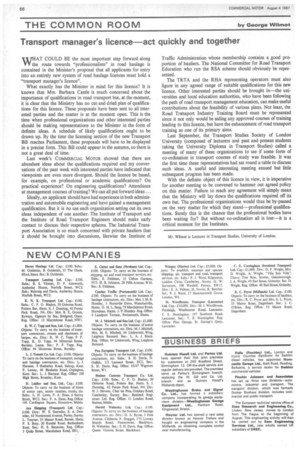Transport manager's licence—act quickly and together
Page 68

If you've noticed an error in this article please click here to report it so we can fix it.
\MliAT COULD BE the most important step forward along le route towards "professionalism" in road haulage is contained in the Minister's proposal that all applicants for entry into an entirely new system of road haulage licences must hold a "transport manager's licence".
What exactly has the Minister in mind for this licence? It is known that Mrs. Barbara Castle is much concerned about the importance of qualifications in road transport but, at the moment, it is clear that the Ministry has no cut and dried plan of qualifications for this licence. These proposals have been sent to all interested parties and the matter is at the moment open. This is the time when professional organizations and other interested parties should be making representations to the Minister in the form of definite ideas. A schedule of likely qualifications ought to be drawn up. By the time the licensing section of the new Transport Bill reaches Parliament, these proposals will have to be displayed in a precise form. This Bill could appear in the autumn, so there is not a great deal of time.
Last week's COMMERCIAL MOTOR showed that there are abundant ideas about the qualifications required and my conversations of the past week with interested parties have indicated that viewpoints are even more divergent. Should the licence be based, for example, on professional or academic qualifications? On practical experience? On engineering qualifications? Attendance at management courses of training? We can all put forward ideas
Ideally, an applicant should have had experience in both administration and automobile engineering and have gained a management qualification. But it is no use each organization setting out its own ideas independent of one another. The Institute of Transport and the Institute of Road Transport Engineers should make early contact to discuss their respective spheres. The Industrial Transport Association is so much concerned with private hauliers that it should be brought into discussions, likewise the Institute of Traffic Administration whose membership contains a good proportion of hauliers. The National Committee for Road Transport Education who run the RSA scheme should obviously be represented.
The TRTA and the RHA representing operators must also figure in any agreed range of suitable qualifications for this new licence. Other interested parties should be brought in—the universities and local education authorities, who have been following the path of road transport management education, can make useful contributions about the feasibility of various plans. Not least, the Road Transport Industry Training Board must be represented since it not only would be aiding any approved courses of training leading to this licence, but have the enhancement of road transport training as one of its primary aims.
Last September, the Transport Studies Society of London University (composed of lecturers and past and present students taking the University Diploma in Transport Studies) called a meeting of many of these organizations to see if some form of co-ordination in transport courses of study was feasible. It was the first time these representatives had sat round a table to discuss such ideas. A useful and interesting meeting ensued but little subsequent progress has been made.
With the definite object of this licence in view, it is imperative for another meeting to be convened to hammer out agreed policy on this matter. Failure to reach any agreement will simply mean that the Ministry will lay down the qualifications required off its own bat. The professional organizations would thus be by-passed on the very matter for which they stand—professional qualifications. Surely this is the chance that the professional bodies have been waiting for? But without co-ordination all is lost—it is a critical moment for the Institutes.












































































































